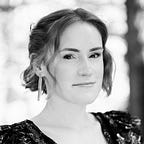You Don’t Have to Choose One Part of Yourself
Logic dictates ‘this or that,’ but real life begs for nuance
![]() I have always had a hard time with both and neither. It’s either on or off. We’re friends or we’re not. I love it or I don’t. I’m all in or completely out.
I have always had a hard time with both and neither. It’s either on or off. We’re friends or we’re not. I love it or I don’t. I’m all in or completely out.
I don’t know how to have acquaintances. People are friends, hope-to-be friends, or I-feel-bad-we’re-not-closer friends. But not everyone wants or needs to be close. There are levels, mountains, spheres, or something like that. Or so they tell me.
I think this way of living in sum totals comes from a childhood split in half.
My parents parted ways when I was four years old, and I have no memory of being both Sara and Iain’s daughter. (Or would it be Iain and Sara’s daughter? I’ve never heard their names uttered as a couple, so I don’t know what they used.) In a way, it was easier that I never knew what it felt like. The division of the world was easier to bear.
I was either my mom’s or my dad’s, never both. I was one or the other, and my identity changed every Sunday. I had to choose. Who do I love more today? Who do I disappoint today?
![]() I was interested in logic from the beginning. When I played logic games, I always tried to solve the questions faster than my mom. I always won. I ate it up. I loved math. There was an answer, and I just saw it.
I was interested in logic from the beginning. When I played logic games, I always tried to solve the questions faster than my mom. I always won. I ate it up. I loved math. There was an answer, and I just saw it.
Formal logic begins with the law of the excluded middle: A or not-A. There is no in between. It’s one or the other — not both, not neither. A statement is either true or false. The world is either flat or it’s not. To be both or to be neither is a logical contradiction, a theoretical and practical impossibility.
However, in my own work in formal logic, I’ve been drawn to paraconsistent, or inconsistency-tolerant, logical systems, where contradictions are possible. In these systems, A and not-A can coexist in a world without the world exploding (à la principle of explosion, which says any statement can be derived from a contradiction).
In moments of lucidity and self-reflection, it’s clear that I’m drawn to certain themes in philosophy as a way to work through something in my personal life. For example, I am drawn to care ethics as a plea to center the…
